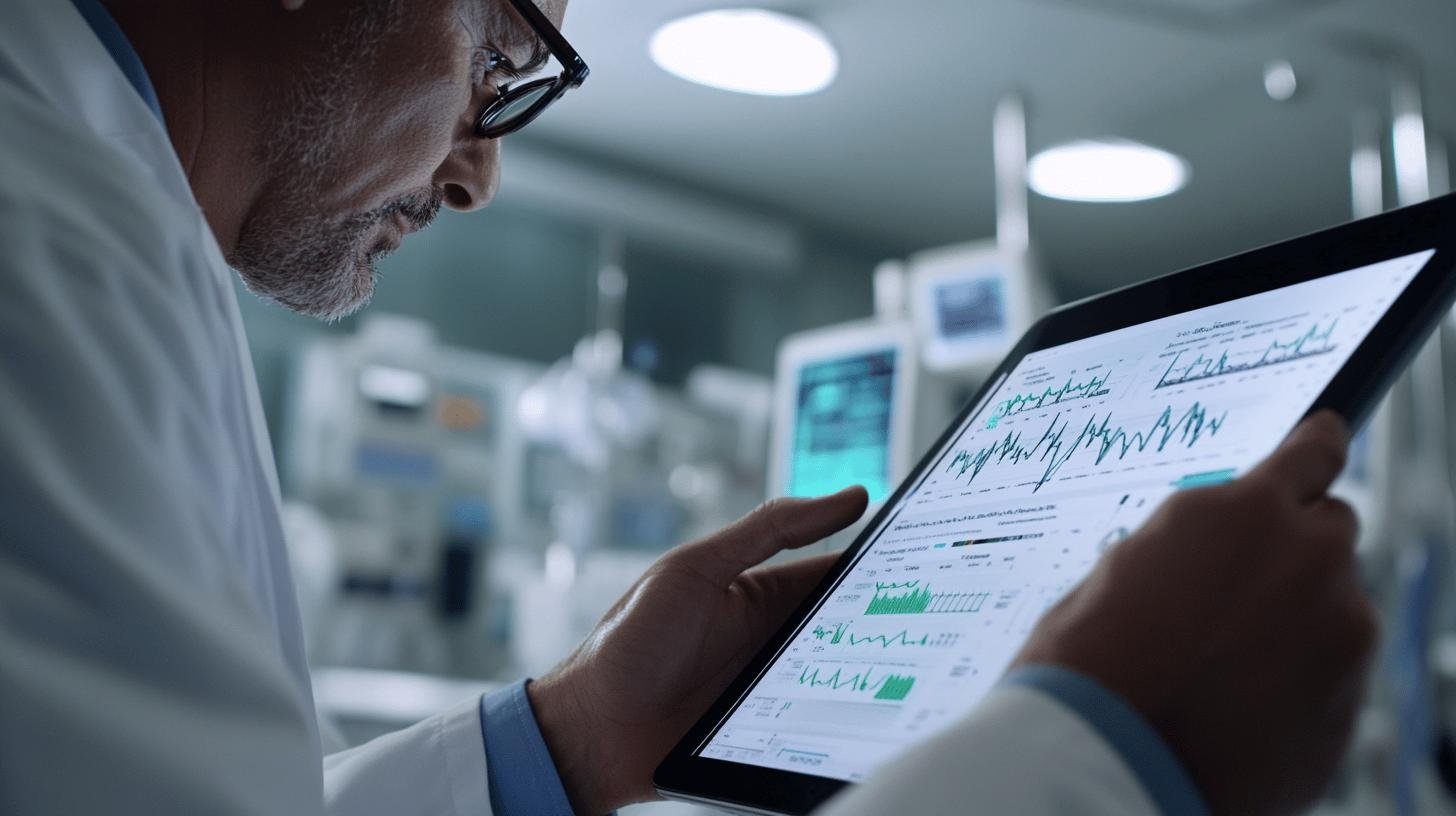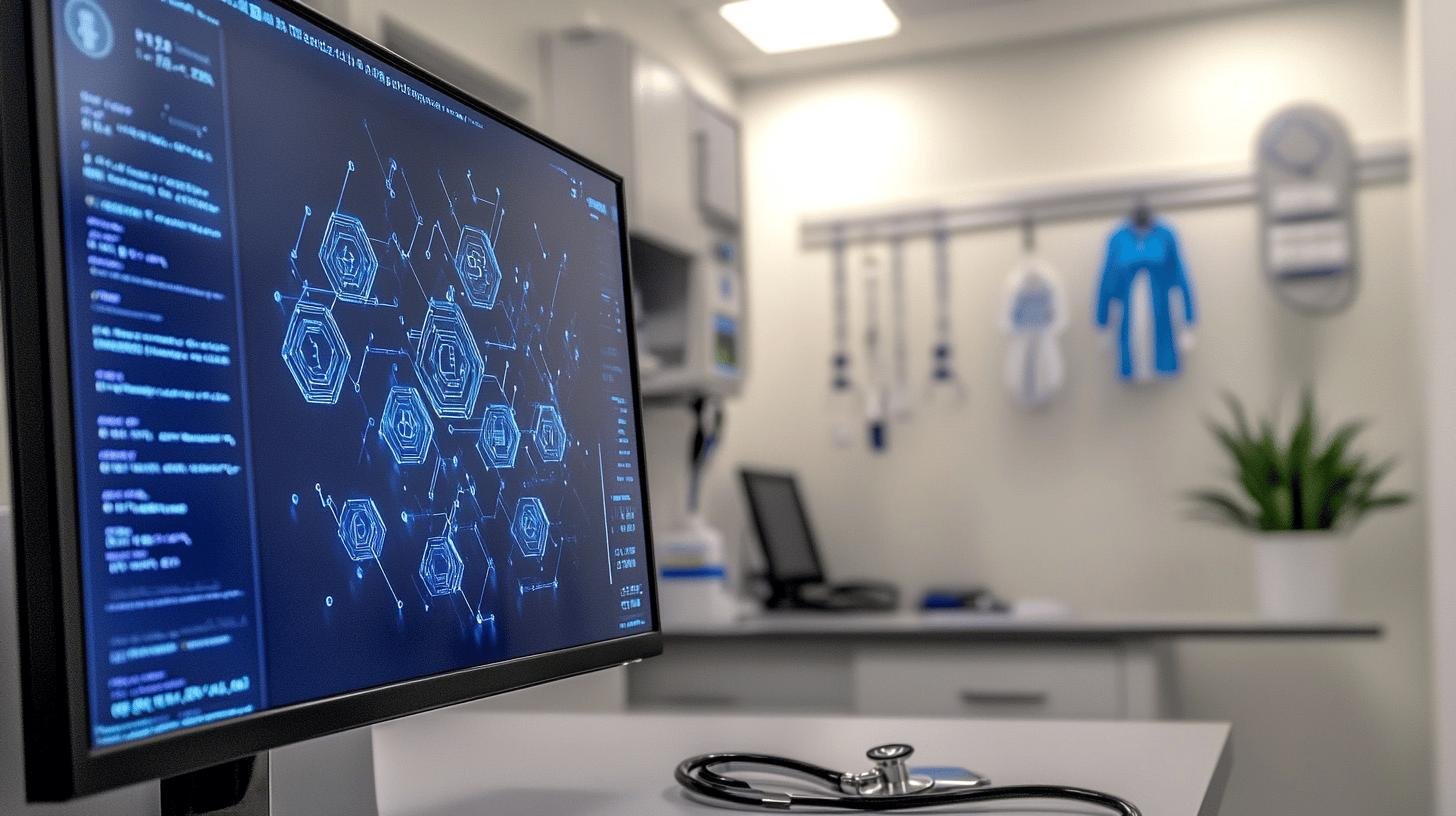TL;DR:
- Healthcare IT market value: $199.5 billion in 2023, projected to grow by 18.7% (2024-2030).
- Some growth drivers are AI, telemedicine, health tech startups, EHRs, wearables, big data, and blockchain.
- Innovative devices like wearables and IoMT improve chronic condition management.
- Telemedicine enhances access, especially in underserved areas.
- AI analyzes data for disease diagnosis and personalized treatment plans.
- Digital health platforms increase accessibility but face security challenges.
- Blockchain ensures healthcare data security and regulatory compliance.
- Personalized medicine uses genomics and AI for tailored treatments.
- Health tech startups received $23 billion in investment in 2022, focusing on effective management and innovation.
Have you ever felt like your doctor’s office was stuck in the past? The healthcare industry is catching up fast, thanks to some mind-blowing tech. We’re talking AI, telemedicine, and even blockchain, shaking things up. Did you know the healthcare IT market is set to skyrocket to a whopping $199.5 billion by 2023? Yep, it’s growing at an 18.7% clip from 2024 to 2030. In this post, we’ll unpack the new market of healthcare technology and the hottest trends transforming healthcare, making it more efficient and accessible. Ready to geek out on the future of medical care?
Trends Shaping the New Market of Healthcare Technology
The healthcare industry is changing fast and is driven by technological advancements. This push aims for cost-effective care and better health outcomes. The healthcare IT market is valued at $199.5 billion in 2023. It’s projected to grow at 18.7% from 2024 to 2030.
What’s Driving This Growth?
Several key factors are behind this growth.
- AI in Healthcare: AI helps analyze patient data and improves clinical decision-making.
- Telemedicine: Offers virtual healthcare services, essential during the COVID-19 pandemic.
- Health Tech Startups: Innovate with new solutions.
- Electronic Health Records (EHRs): Become essential for data management.
- Wearables and IoMT: Track health metrics and help manage chronic conditions.
- Big Data and Analytics: Aid in disease prevention and health trend analysis.
- Blockchain: Enhances data security and integrity.
These trends are fundamentally reshaping healthcare delivery. From AI diagnostics to telemedicine, the landscape is evolving. This evolution makes healthcare more accessible, efficient, and personalized.
Innovative Medical Devices Revolutionizing Healthcare

The use of innovative medical devices is skyrocketing. Wearables and remote monitoring devices track vital health metrics like heart rate and blood pressure. These devices are crucial for managing chronic conditions and connecting patients to care.
Wearables and IoMT
Wearables include smartwatches and fitness trackers monitoring steps and sleep patterns. The Internet of Medical Things (IoMT) connects wearables with apps and autonomous devices. For instance, IoMT can link a heart monitor to a smartphone app, sending real-time data to healthcare providers. These devices can also alert you and your doctor to abnormalities, potentially saving lives.
| Device Type | Function | Impact |
|---|---|---|
| Wearable Fitness Trackers | Monitor physical activity and sleep patterns | Encourage healthy lifestyle choices |
| Smartwatches | Track heart rate and notify of irregularities | Early detection of cardiac issues |
| IoMT Devices | Connect medical devices to mobile apps | Enable real-time health monitoring |
| Remote Blood Pressure Monitors | Measure and report blood pressure | Manage hypertension effectively |
| Autonomous Health Devices | Perform routine health checks autonomously | Reduce the need for frequent doctor visits |
Future Potential
Imagine a future where your smartwatch monitors your heart rate and predicts health issues before they become serious. Autonomous devices could perform routine health checks, saving you doctor visits. The impact of these innovations on healthcare is profound.
The Rise of Telemedicine and Virtual Healthcare Services
Telemedicine is booming, especially in North America, due to the COVID-19 pandemic. Virtual healthcare services break down access barriers, offering routine check-ups to specialized consultations from home. This shift is convenient and essential, reducing the need for in-person visits. It saves time and reduces infection spread. It also helps those in remote areas get necessary care without long travel.
Telemedicine in Underserved Areas
Telemedicine is vital for underserved areas. Imagine living in a rural town with the nearest specialist miles away. Telemedicine bridges this gap through video consultations. This is crucial for frequent monitoring of conditions like diabetes or heart disease. It ensures quicker diagnoses and treatments, improving overall health outcomes.
Remote Patient Monitoring
Remote patient monitoring (RPM) uses devices like smartwatches and sensors to track vital signs. These devices send real-time data to healthcare providers. Providers then make informed care decisions. RPM is a lifesaver for chronic disease management, reducing frequent doctor visits. It helps in the early detection of potential issues, allowing timely interventions and better chronic disease management.
Telemedicine and virtual healthcare services are changing healthcare delivery, making it more accessible, efficient, and personalized. The future of healthcare is digital, and telemedicine leads the way.
AI and Machine Learning in Healthcare

AI and machine learning are revolutionizing healthcare. They analyze patient data, detect patterns, and improve clinical decision-making. This results in more personalized treatment plans and better patient outcomes. Think of AI as a super-smart assistant for doctors.
Applications
- Disease Diagnosis: AI systems analyze medical images to identify diseases early.
- Predictive Analytics: Forecast health trends and potential outbreaks.
- Personalized Treatment Plans: Tailor treatments based on individual patient data.
- Virtual Health Assistants: Provide instant medical advice and reminders.
- Robotic Surgery: Enhance precision and reduce recovery times.
- Drug Discovery: Accelerate the process of finding new medications.
Benefits and Concerns
AI brings many benefits but has cybersecurity concerns. Hackers are adopting AI technologies, posing significant threats. Robust cybersecurity measures are crucial to protect sensitive patient data. While AI revolutionizes healthcare, data security remains paramount.
The Impact of Digital Health Platforms and Mobile Health Apps
Digital health platforms are transforming healthcare. They offer various services, from telemedicine to electronic health records (EHRs). These platforms make healthcare more accessible, allowing patients to consult doctors, get prescriptions, and monitor chronic conditions from smartphones. It’s like having a doctor’s office in your pocket.
Benefits and Challenges
Benefits include improved access to medical services, better patient experiences, and lower delivery costs. Digital health platforms also enhance decision-making accuracy and speed up information sharing. Imagine instant lab result updates or having all your medical history in one place.
Challenges include data security risks and the need for robust internet infrastructure. Not everyone is tech-savvy, which can be a barrier.
Popular Digital Health Apps
- MyFitnessPal: Tracks diet and exercise.
- Headspace: Provides guided meditation and mindfulness.
- Apple Health: Aggregates health data from various apps and devices.
- Fitbit: Monitors physical activity and sleep patterns.
- Teladoc: Offers virtual consultations with healthcare providers.
Future Potential
With AI and machine learning advancements, these platforms will become more intuitive and personalized. Imagine a health app that predicts potential health issues and suggests preventive measures. The possibilities are endless, and the impact on healthcare delivery is profound.
Blockchain and Data Security in Healthcare

Blockchain in healthcare is a game-changer for data security. Think of it as an ultra-secure digital ledger that keeps health information safe from prying eyes. Blockchain ensures that medical records are accurate and tamper-proof.
How Blockchain Enhances Data Security
- Encryption: Converts data into a code to prevent unauthorized access.
- Decentralization: Distributes data across multiple nodes, eliminating single points of failure.
- Immutability: Ensures data, once recorded, can’t be altered or deleted.
- Audit Trails: Provides clear data transaction history, making tracking changes easy.
- Consensus Mechanisms: Requires multiple nodes’ agreement before adding data, ensuring accuracy and security.
Regulatory Compliance
Blockchain excels in regulatory compliance. Regulations like HIPAA and EDI require strict data security measures, and blockchain’s robust protocols help healthcare providers comply. Blockchain protects sensitive patient information and meets legal standards, ensuring a safer environment.
Personalized Medicine and Precision Health
Personalized medicine is growing for a good reason. Imagine healthcare as unique as your fingerprint. Doctors use genetic information to create treatment plans specifically for you, like tailoring a suit.
Role of Genomics and AI
Genomics technology delves into DNA, identifying genetic variations affecting health. AI analyzes this data, finding patterns and predicting treatment responses. This is a game-changer. For example, two patients with the same cancer type might receive different treatments based on their genetic profiles, ensuring the most effective care and reducing trial and error.
Future Potential
The potential of precision health is immense. We’re moving toward predicting and preventing diseases before they manifest. Personalized health data will guide lifestyle choices to prevent future illnesses. With genomics and AI advancements, the sky’s the limit for personalized medicine achievements.
The Role of Health Tech Startups in Driving Innovation

Health tech startups are sprouting up like wildflowers. These innovative companies drive medical advancements with new ideas, quick adaptations, and a willingness to take risks. Investment in healthcare technology was $44.8 billion in 2021 but dropped to $23 billion in 2022. Why? Investors are becoming more selective, focusing on startups with solid management visions, promising product pipelines, and realistic project timelines.
What Investors Look For
A startup with a brilliant idea but poor execution won’t go far. Investors want a clear plan and the ability to pivot if necessary. Startups must demonstrate tangible benefits, like improved patient outcomes or cost savings for healthcare providers.
Future Outlook
As technology evolves, so do opportunities for innovation. Startups leveraging AI, IoT, and blockchain will be in prime positions to revolutionize healthcare. Staying adaptable and pushing boundaries are key. These trailblazers shape healthcare’s future.
Final Words
Trends in healthcare technology, such as AI, telemedicine, and innovative medical devices, are redefining how we approach health and wellness.
This new wave of technology is about making healthcare more accessible, personalized, and efficient. From wearables and mobile apps to cutting-edge AI tools, these innovations promise a brighter, healthier future.
As these trends continue to evolve, the new healthcare technology market will keep pushing boundaries, offering solutions that once seemed like science fiction.
Here’s to a more innovative, healthier tomorrow!
FAQ
What is the newest technology in healthcare?
The newest healthcare technologies include AI, telemedicine, wearables, and electronic health records (EHRs). These technologies aim to reduce costs, improve outcomes, and make healthcare more accessible.
What is the future of health tech?
The future of health tech looks promising with advancements in AI, personalized medicine, and digital health platforms. Expect more innovations that enhance patient care and data security.
What are the current emerging trends in healthcare?
Current emerging trends in healthcare include:
- Use of AI for diagnostics and patient care
- Rise of telemedicine and virtual healthcare
- Growth in health tech startups
- Increased reliance on EHRs and digital platforms
- Innovations in wearables and IoT devices
How is technology changing the healthcare industry?
Technology is changing the healthcare industry by:
- Improving diagnostic accuracy with AI
- Expanding access through telemedicine
- Enhancing chronic disease management with remote monitoring
- Securing patient data with blockchain technology
- Personalizing treatment plans with genomics and AI

